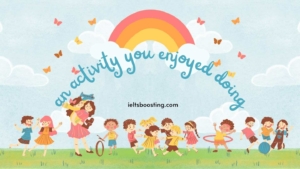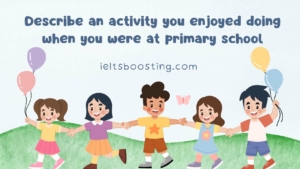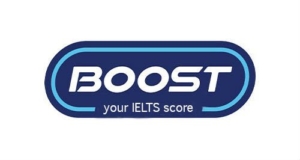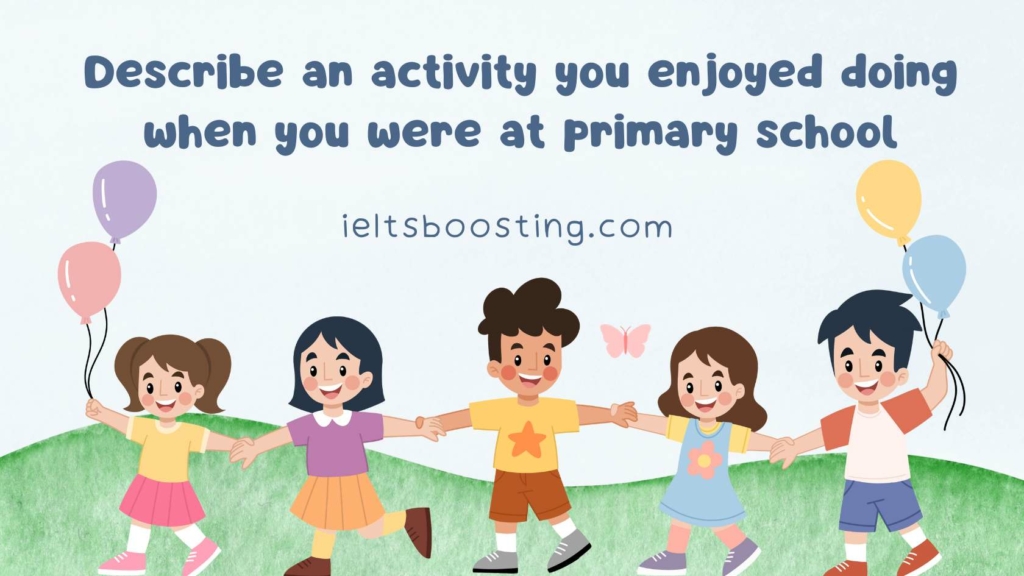Describe an activity you enjoyed doing when you were at primary school
You should say:
What the activity was
How often you did the activity
Who you did it with
And explain why it was your favourite activity

Describe an activity you enjoyed doing when you were at primary school
Sample answer:
One activity that I enjoyed immensely during my primary school years was playing soccer during recess. This was a daily occurrence, as every recess break, a group of us would rush to the school field to start a match. The group consisted of my close friends and occasionally other classmates who wanted to join in. We didn’t have formal teams; we just divided ourselves equally and started playing.
I cherished these soccer games for several reasons. First, they were a great way to release energy and take a break from the classroom environment. The thrill of running across the field, strategizing with teammates, and scoring goals was exhilarating. At that time, it was just a fun activity, but looking back now, I realize it also helped me develop teamwork and social skills, as we learned to communicate effectively and work together towards a common goal.
Moreover, these soccer games fostered a sense of community and camaraderie among us. We shared many laughs and high fives, and even when we disagreed about a foul or a goal, it was all in good spirits. This activity was not just about playing a sport; it was about building friendships and making memories. Those recess breaks playing soccer remain some of my fondest memories from primary school.
Useful vocab:
- Immensely – extremely; to a great degree.
- Occurrence – an event or incident.
- Rush – to move with urgency.
- Formal – following rules or customs, often in an exact and proper way.
- Divide – to separate into parts or groups.
- Cherish – to feel or show great love for; to value highly.
- Exhilarating – bringing great joy and excitement.
- Teamwork – the combined action of a group, especially when effective and efficient.
- Camaraderie – mutual trust and friendship among people who spend a lot of time together.
- Foster – to encourage or promote the development of something.
- Disagree – to have a different opinion.
- In good spirits – in a good mood; cheerful.
- Fond – having a strong preference or liking for.
- Strategize – to plan the actions you will take to achieve a goal.
- Communicate effectively – to convey information or feelings in a way that is well understood.
- Common goal – a shared aim or objective.
- Recess – a break period during the school day.
- Social skills – the skills we use to communicate and interact with each other.
- Community – a group of people living in the same place or having a particular characteristic in common.
- Build friendships – to develop strong bonds of mutual affection with others.

Describe an activity you enjoyed doing when you were at primary school
Forecast speaking from 1-4 2024
Part 3-Describe an activity you enjoyed doing when you were at primary school
What activities do children often do in your country?
In my country, children engage in a variety of activities, both educational and recreational. One popular activity is playing outdoor sports like soccer or basketball, which are great for physical health and socializing. Many also spend time on creative hobbies like drawing or playing musical instruments, which helps in developing their artistic skills. Additionally, with the rise of technology, a significant amount of time is spent on electronic devices for both learning and entertainment purposes.
Useful Vocabulary:
- Recreational – relating to or denoting activity done for enjoyment when one is not working.
- Socializing – participating in social activities; mixing socially with others.
- Creative hobbies – activities involving the use of imagination or original ideas to create something.
- Artistic skills – talents or abilities in the arts, such as painting, music, or dance.
- Technology – the application of scientific knowledge for practical purposes, especially in industry.
- Electronic devices – gadgets like tablets, smartphones, and computers.
- Learning and entertainment purposes – activities aimed at gaining knowledge or enjoyment.
- Physical health – the condition of a person’s body, especially regarding its ability to function effectively.
What do parents in your country let their children do?
In Vietnam, parents generally encourage their children to focus heavily on academics, as education is highly valued in our culture. Many children attend extra classes after school, like English or math tutoring, to excel in their studies. Aside from academics, parents also let their kids participate in traditional Vietnamese activities, such as martial arts or learning to play traditional instruments. In urban areas especially, it’s becoming more common for kids to be involved in modern hobbies like coding or robotics, reflecting the growing influence of technology.
Useful Vocabulary:
- Academics – relating to education and scholarship.
- Extra classes – additional educational sessions outside of regular school hours.
- Tutoring – private teaching, typically one-to-one.
- Traditional Vietnamese activities – cultural practices and hobbies specific to Vietnam.
- Martial arts – various forms of self-defense or combat practices, often of East Asian origin.
- Traditional instruments – musical instruments that are part of a country’s cultural heritage.
- Urban areas – regions characteristic of a city or town.
- Modern hobbies – contemporary activities or pastimes, often involving new technology.
- Coding – the process of writing instructions for computers.
- Robotics – the branch of technology dealing with the design, construction, operation, and application of robots.
What are the differences between activities at home and at school?
Activities at home and at school differ quite a bit. At school, activities are usually more structured and educational, like formal classes, sports training, or group projects, guided by teachers and schedules. At home, activities tend to be more relaxed and flexible, such as playing video games, reading, or pursuing personal hobbies, allowing for individual preferences. Also, home activities often involve family interaction, like cooking or watching movies together, fostering a different kind of social environment compared to school.
Useful Vocabulary:
- Structured – organized and planned in a clear way.
- Educational – relating to the process of receiving or giving systematic instruction.
- Formal classes – official, scheduled educational sessions.
- Sports training – practice sessions for athletic activities.
- Group projects – collaborative tasks involving multiple participants.
- Relaxed and flexible – informal and adaptable to one’s preferences.
- Personal hobbies – leisure activities one does for pleasure.
- Family interaction – engagement or activities involving family members.
- Social environment – the setting in which social interactions occur.
- Pursuing – engaging in an activity or course of action.

Describe an activity you enjoyed doing when you were at primary school
Why do some people like to participate in activities?
People participate in activities for various reasons. Firstly, activities like sports or hobbies offer an excellent way to unwind and relieve stress, providing a break from daily routines. Additionally, they present opportunities for socializing and meeting new people, which is essential for building friendships and networks. Many are drawn to activities for personal development, as they can learn new skills or improve existing ones. Finally, the sense of achievement and satisfaction gained from participating in and completing an activity can be a significant motivator.
Useful Vocabulary:
- Unwind – relax after a period of work or tension.
- Relieve stress – reduce the pressure or tension one feels.
- Socializing – participating in social activities; interacting with others.
- Personal development – the process of improving oneself through activities that develop talents and potential.
- Achievement – something accomplished, especially by superior ability or special effort.
- Satisfaction – fulfillment of one’s wishes, expectations, or needs.
- Motivator – something that provides a reason or stimulus to do something.
- Daily routines – regular, habitual activities.
- Building friendships – the act of forming close and lasting relationships.
- Learn new skills – acquire new abilities or expertise.
What activities do people do in their free time?
In their free time, people engage in a wide range of activities depending on their interests and resources. Many enjoy leisure activities like reading, watching movies, or listening to music, which are great ways to relax and unwind. Outdoor activities, such as hiking, cycling, or playing sports, are also popular, especially for those who love being in nature or staying physically active. Lastly, social activities, like hanging out with friends or attending community events, play a crucial role in maintaining relationships and social well-being.
Useful Vocabulary:
- Leisure activities – non-work-related activities done for relaxation or pleasure.
- Unwind – to relax and reduce stress.
- Outdoor activities – activities performed in the open air, away from indoor settings.
- Physically active – engaging in physical exercise or sports.
- Social well-being – the extent to which a person feels a sense of belonging and social inclusion.
- Hanging out – spending time in a relaxed manner with friends or acquaintances.
- Community events – public gatherings or activities organized for the people living in a particular area.
- Interests – activities or subjects that a person enjoys and finds important.
- Resources – available time, money, or other assets one can use.
- Maintaining relationships – keeping connections with others active and positive.


